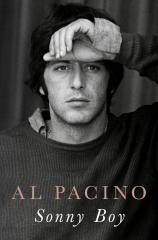Sonny Boy: A Memoir
Review
Sonny Boy: A Memoir
When an actor of Al Pacino’s caliber writes a memoir, it is an event. Just think of his storied career: The Godfather, Dog Day Afternoon, Serpico, Heat, Scent of a Woman and, yes, Scarface. Since he’s not known for revealing interviews, to finally have this book is a gift not only to his fans, but for movie and theater goers everywhere. But where did this journey begin?
Told in a mostly linear fashion, Pacino relates his humble beginnings in the South Bronx, born to his mother, Rose, and father, Sal, who left the family when he was very young. He mostly lived with his delicate mother and grandparents, who had a profound influence on him. Rose took him to the movies often, and at that age, she “was everything to me then. Somehow she always knew when something was about to happen.” Given the hardscrabble nature of their neighborhood, he gives complete credit to his mother for his being alive and getting out. His three close friends from the tenements would succumb to early, drug-related deaths.
But it was an insightful junior high school teacher who believed that Pacino was destined for creative greatness. After doing a school play, he had an epiphany: “[J]ust like that, it happened. The power of expression was revealed to me, in a way it never had before. I wasn’t even searching for it. That’s the beauty of these things. You’re not looking for it. I’m opening my mouth and I’m understanding somehow that I can speak. Words are coming out, and they’re the words of Strindberg, but I’m saying them as though they’re mine. The world is mine, and my feelings are mine, and they’re going beyond the South Bronx. I left the familiar. I became a part of something larger…. All of a sudden, in that moment, I was universal.”
"It’s refreshing to read a memoir from such a titan of his industry like Pacino, and even more refreshing to discover how humble and grateful he is for his success."
As Pacino was finding his footing in his prospective career, his mother died from a probable accidental overdose. Looking back from his vantage point now, he realizes that her “tragedy was poverty. She was stuck in the mud of it and couldn’t move.” He learned to channel his pain into his art and would canvas the entirety of Manhattan to find whatever acting work he could. One influential early role was Israel Horovitz’s play, The Indian Wants the Bronx, where he would gain industry attention and work with actor John Cazale, the first of three memorable collaborations.
But it was Pacino’s performance in the play Does the Tiger Wear a Necktie? that captured the attention of director Francis Ford Coppola, who was beginning to cast The Godfather, based on Mario Puzo’s bestselling novel. Despite network executives pushing actors like Robert Redford and Warren Beatty upon him, Coppola only wanted Pacino for the role of Michael Corleone. Even though he had been working in the theater for a few years, The Godfather made him an overnight success.
In the 1970s, it seemed as if Pacino was everywhere. Movies like Serpico and Dog Day Afternoon would garner critical acclaim and Oscar nominations. But with artistic success, massive fame followed, which he struggled with: “My fame was not just bigger after Dog Day, but more intense…. You’re very much on your own in dealing with it. There’s not many people around you who can tell you, here’s how you cope with it, here’s how you reckon with it --- this new intensity of a changed life, one that leads to desperate solitude and a strange way of being set apart from the world…. And the way I dealt with it was I took drugs and drank.” At a certain point, Pacino realized that he needed to change the way he dealt with his feelings and insecurities. That’s when he got sober.
Throughout the ’70s and early ‘80s, the movies kept coming. But after 1983’s Scarface, Pacino found himself in metaphoric “Hollywood Jail.” The critics savaged the film, and people questioned his choice to play uber-violent drug lord Tony Montana. The offers then dried up, giving him an unexpected four-year hiatus. While he kept himself busy with creative projects, they weren’t paying the bills, and he managed to go broke.
Luckily, the script for Sea of Love came along, which became a big commercial and critical success in 1989. Suddenly, Pacino was back in the black and was involved in hits like Frankie and Johnny, Scent of a Woman and Carlito’s Way, as well as some over-the-top performances like The Devil’s Advocate. He continues to work to this day. At 84, he has six projects in the can and shows no signs of slowing down.
It’s refreshing to read a memoir from such a titan of his industry like Pacino, and even more refreshing to discover how humble and grateful he is for his success. His overarching love of acting has always guided his decisions. Forever thankful to his mother and grandparents for keeping him on the right path when so many he knew had fallen along the way, he maintains his love of storytelling and bringing entertainment to audiences.
Ghostwritten by Dave Itzkoff, SONNY BOY (Pacino’s childhood nickname) goes along at a breezy pace, especially when detailing his early days in the Bronx and Greenwich Village as a struggling actor. Every so often, he’ll relate a story that makes the reader wonder why he’s telling it. But for the most part, he's incredibly entertaining and honest, delighting in the behind-the-scenes stories and allowing his true artistic voice to shine through. Go forth and enjoy, Pacino fans. “Hoooah!”
Reviewed by Bronwyn Miller on October 25, 2024
Sonny Boy: A Memoir
- Publication Date: October 15, 2024
- Genres: Memoir, Nonfiction
- Hardcover: 384 pages
- Publisher: Penguin Press
- ISBN-10: 0593655117
- ISBN-13: 9780593655115



